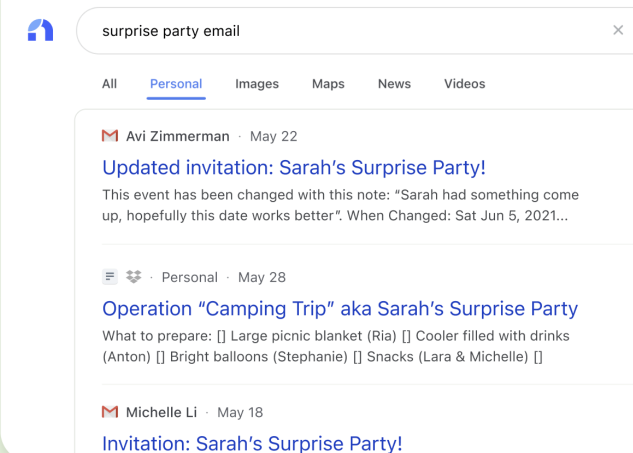Neeva, an ad-free search engine launched last year by a former engineer and executive best known for spearheading Google’s advertising tech business, is about to land in Europe.
The Mountain View, California-based company officially launched a subscription-only search engine in its domestic U.S. market in June last year, later going on to add a free “basic” tier to the mix with certain restrictions in place. In the intervening months, Neeva said it has amassed more than 600,000 users, the vast majority of which are on a free plan, and now the company is looking to markets farther afield in search of growth.
While it’s yet to set up a formal European hub, choosing instead to steer the ship from 5,000 miles away on the U.S. West Coast, tomorrow Neevia is switching on its proverbial lights in the U.K., France and Germany. Europe is perhaps an obvious first step for Neeva’s inaugural expansion plans, owing to the slew of antitrust complaints currently faced by the mighty incumbent Google, with legislators targeting everything from e-commerce (Google Shopping) and Android to its dominance of the online ad market.
Search sits at the heart of many of these products, serving as gateway to the internet for billions of people globally — and this is why the European Union has forced Google to loosen its stranglehold by offering Android users multiple options for their default search engine during setup. While this has largely been ineffective for myriad reasons related to how Google has implemented this process, it does position Europe as fairly fertile territory for any fledgling search startup to roam.
TechCrunch sat down with Neeva co-founder and CEO Sridhar Ramaswamy in London this week to get the lowdown on where things are at with his three-year-old company and where things could go with further market expansions on the horizon.
Search mission
To backtrack just a bit, Ramaswamy worked his way through Google’s engineering ranks over a 15-year period, emerging as senior vice president and the driving force behind Google’s $100 billion-plus ads and commerce business. He left in 2018 to join esteemed venture capital (VC) firm Greylock Partners, a role he continues in today, albeit in a reduced capacity.
“It’s a part time job — I advise them on investments; it’s very light,” Ramaswamy said.
It’s no coincidence that Greylock has invested in Neeva across two separate rounds of funding alongside Sequoia Capital among other esteemed investors. Neeva has raised north of $80 million since its inception, a figure that is likely to rise as Neeva doubles down on its global ambitions — its next steps will be to extend into other English-speaking countries including India, Canada and Australia, which may happen before the year’s out.
“A startup founder’s primary job is to raise money so that you don’t run out,” Ramaswamy added.
Neeva is available as a native mobile app on Android and iOS, while it’s also available on the desktop (Chrome, Edge, Firefox, Safari) via a browser extension that blocks trackers and delivers Neeva’s own brand of organic search. This means that a news or information website that you visit won’t be able to send your data to any third party for profiling or personalized ads.

An ad-free environment is one of Neeva’s big selling points. Rather than having to scroll through half-a-dozen or more sponsored results to get to the relevant links, Neeva delivers what it deems to be the most relevant results from the very top.

But while few people will miss paid “inorganic” results, there are always other trade-offs with any search product that pontificates about user privacy.
Indeed, one of the main sticking points with privacy search engines is that the “privacy” often comes at the expense of genuine utility, which is what Google brings. Google Search includes a bunch of value-added features, such as telling you how busy a pub is likely to be at specific time, where the nearest pub is in relation to your precise current location and how you go about getting to the nearest pub via the gift of turn-by-turn navigation. And that’s all before we talk about up-to-date opening times, addresses, phone numbers and more for just about every public establishment a city has to offer.
Neeva, as with other privacy search engines, goes some way toward addressing this gap through integrations with third-party data providers such as Yelp and Tripadvisor, while Apple Maps is helpful for seeing where places are. But the information isn’t always complete or recent, and without sharing your exact location, navigation isn’t readily available.

By default, Neeva uses a person’s IP address to “infer” where the user is, though based on my tests, it was several hundred miles off. But users can choose to toggle on their current exact location, which allows Neeva to provide more accurate results.

Other selling points include the ability to filter out specific information sources. For example, if you don’t want to buy from Amazon, you can tell Neeva to deprioritize it in future results. Similarly, with news from a particular publisher, you can tell Neeva that you want to see fewer stories from that outlet — or more, if you like it.

And this highlights one of the major selling points of Neeva’s business model. It’s not really in Google’s interests to allow users to demote specific companies in search results, but in Neeva’s case it is: It’s targeting consumer dollars not corporate dollars.
There is a risk, perhaps, that this could all play into the much-maligned echo chamber effect that has blighted Big Tech in recent years — algorithms essentially serving people with the same stuff from the same sources, rather than exposing them to “new ideas” or content that they might not otherwise be exposed to. If someone hates a bunch of news publications with a particular political leaning, they can choose to minimize their presence in search results. But Ramaswamy is quick to stress that quality is a fundamental element in its search indexing algorithms.
“It’s a little subtle, in the sense that if you prioritize a site higher, we won’t show you junk from that site — it still has to pass a relevance threshold,” he said. “The search result that we are pointing to has to be meaningful for your query. Roughly what that means is that all things being equal, ‘prioritize this site higher’ or all things being equal, ‘let’s get rid of this site.’ But if this site is the only one that has a useful result for your query, even if you deprioritize it, we will show it because we think it is better for you to show it than to get zero results.”
And then there is the thorny issue of how Neeva generates its results. Similar to other “alternative” search engines, Neeva does lean somewhat on Bing for some of its web searches, though this is something that it’s looking to transition away from as it pushes toward relying entirely on its own tech stack — possibly some time within the next year.
“All of the personal indexing is tech that we have completely built from scratch,” Ramaswamy said. “Web search currently is split, I would say roughly 50-50 between our own tech and Bing. We are running a very large indexing and search system that is serving more and more results.”
From a privacy perspective, Ramaswamy noted that Neeva doesn’t send any personal data to Bing.
“We don’t send IP addresses; we don’t send precise location,” he said. “The entirety of Neeva looks like a single user to Bing.”
On top of that, Neeva also lets all signed-in members connect personal Google, Office 365 and Dropbox accounts, essentially turning web search into a fully personalized search tool spanning email, documents, calendars and more. Premium users, meanwhile, are able to connect additional counts such as Slack, GitHub, Confluence, Jira, Box, Notion and Figma.

A delicate balancing act
While many people might find great utility in being able to search through all their personal files via Neeva, if someone’s motivation for joining Neeva in the first place is due to privacy concerns in competing products, then they would perhaps be best not enacting any of the integrations on offer. For example, Neeva requests read and write permissions when a user connects GitHub to their Neeva account, a requirement stipulated by GitHub’s API for downloading data, though Neeva says that it “will not use write access in any way.”
It’s for these very reasons that Google has segued away from getting too personalized in search results. Once upon a time, Google would surface personal information such as upcoming flight or hotel reservations in search results using data gleaned from Gmail, not to mention serving personalized ads based on the content of users’ inboxes. But in the end, the privacy palaver this created was just too much and Google eventually untethered these products to give the impression that it really doesn’t care about your data — and also appease queasy enterprise customers concerned that Google could be reading their emails.
Much of this comes down to a delicate balancing act between privacy and utility, while affording users some control over their preferences — not everybody wants the same thing from a search engine, after all. Some people might be happy for Google to scan their inboxes so they can easily query when their flight is scheduled to depart, while others might balk at the idea — but the balkers might be perfectly happy to have targeted, ad-supported search results if it means they get to access Google’s arsenal of products with no financial burden to bear.
For Neeva, it’s much the same dilemma: how to deliver a genuinely useful product that people not only want to use but will (one day) be happy to pay for. And how to do all this without adopting a traditional commercial approach involving advertising and corporate interference. Defaults is the name of the game — make the product simple and as un-Google-like as possible out of the box, and then allow people to manually tweak things to suit their own privacy standards.
In short, people can use Neeva for simple web searches without advertising or having to sign up or do anything. And if they’re happy to place a little anonymity on the line, they can create a free account to unlock additional features including searching across third-party personal accounts and deprioritizing sources from search results. Those who sign up for a paid plan at $4.95 per month, meanwhile, get access to additional privacy-focused tools including premium password management and VPN services from LastPass and Bitdefender. Neeva plans to add more such tools to the list of options in the future.
Alongside its European launch this week, Neeva is also making one notable change across the board in all markets where it operates. Thus far, Neeva has stored 90 days of search history by default, with the user having to deactivate this feature manually if they don’t want it. The reason that Neeva had this on by default previously was because search history offers genuine utility to the end user — recommendations on the homepage or autofilling search words based on previous searches. But for a product that is pitched substantively on its privacy credentials, this could be construed as an ill-fitting feature, which is why moving forward search history will be off by default.
“We’re changing this because search is so personal; it just felt that it was better that the default is no search history whatsoever,” Ramaswamy said. “We figured it was better as an explicit opt-in feature.”
Search and destroy
All in all, however, anyone who’s accustomed to the immediacy and slickness of Google Search will probably struggle to transition to an alternative search engine — Neeva or otherwise — and not notice the inherent downsides. That’s why Google has succeeded so much at what it does — it creates incredibly sticky products that suck people in, making it difficult to escape.
Maps is perhaps one of the best examples of how Google has succeeded at what it does, taking money from one product, investing it in another and effectively killing any hint of competition.
“I use Google Maps for the reasons that you mention — if I want a train route, it’s hard to beat,” Ramaswamy said. “But the flip side is that this is also a company that has put everybody that could have done any innovation in these areas out of business — just by virtue of how big they are. Remember, providing maps used to be a business in its own right 10 years ago. There were a whole set of companies that did this. They’re all out of business. That’s because Google takes the money that you get from search ads, pumps it into Maps and knocks out the entire category.”
Acknowledging the scale of the problem Neeva is up against is one thing, addressing it is an entirely different thing. So what it all comes down to is tackling one problem at a time, starting with taking ads out of the search equation for those who deem that to be important and throw a few value-added treats into the mix.
“The way a startup needs to address this is by starting with a core area of utility and make sure that they deliver to a subset of people,” Ramaswamy said. “That’s how startups succeed — [if] you try and do everything at the same time, it is problematic.”
One of the big elephants in the room here, of course, is Ramaswamy’s journey from leading Google’s ads and commerce unit, to building something akin to the polar opposite.
“I just felt like it was an exploitative model, and I saw that the ad platforms [like] Google, Facebook and Amazon were increasingly reaping the benefits of scale,” Ramaswamy said. “So I wanted to go back to basics and create a product that was about the user. I felt like a better product was possible, and that we had all given up — I consider myself a technologist first and foremost, and an ads person secondarily.”
Privacy push
A quick peek across the competitive landscape reveals plenty of alternative “privacy” search engines out there, including well-funded incumbents like DuckDuckGo, You.com and Brave, which recently expanded beyond its browser roots with the launch of its own-brand search engine. All these companies have a lot in common; for example they tout “privacy” as a core selling point. But they’re also all figuring out a way to build a viable search business that doesn’t necessarily have to involve countless advertisements — and if it does have to involve ads, then it’s based on less invasive keyword searches alone.
Brave, for example, is toying with a similar model to Neeva insofar as it will soon offer a subscription-based premium service that will allow users to remove ads from search results. But that also tells us that those on the free plan will have to contend with ads. Elsewhere, DuckDuckGo sports keyword-based ads that represent a large part of its business model, while You.com is still largely figuring out its monetization philosophy, but for now it’s based on affiliate links and may include ads in the future.
Neeva stresses that its business model is absolutely not based on advertisements or affiliate links — for now, it’s all about trying to get folks signed up to a premium plan. It’s also considering additional monetization conduits, including bundling partnerships with other like-minded companies such as encrypted email provider Proton, or even licensing deals to power application search within enterprises.
While it’s already possible to use Neeva in any country already, so far it has only been tailored for the U.S. market. With this latest rollout, consumers in the U.K., France and Germany will be able to access a fully localized version of the product, which includes local-language translations and searches are tailored for local users.
“It’s [localization] making sure that things like search quality is okay — it’s hard to see from the outside, but there’s a lot of work behind the scenes,” Ramaswamy said. “But then there are visible things that you expect from a search engine, everything from weather to a currency converter and local translations.”
At launch, Neeva is only making its basic ad-free service available in Europe, with the premium incarnation rolling out in the coming weeks at the local currency equivalent of around $5 per month.






























Comment